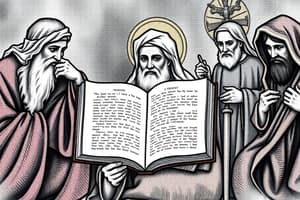Podcast
Questions and Answers
Which of the following individuals is considered a prophet in Islam but a messiah in Christianity?
Which of the following individuals is considered a prophet in Islam but a messiah in Christianity?
- Siddartha Gautama
- Jesus (correct)
- Muhammad
- Abraham
What does 'Buddha' mean?
What does 'Buddha' mean?
- The Teacher
- The Prophet
- The Chosen One
- The Awakened/Enlightened One (correct)
The term 'one who submits to the will of Allah' refers to:
The term 'one who submits to the will of Allah' refers to:
- Muslim (correct)
- Christian
- Buddhist
- Judaism
Which of these is considered a central figure in Judaism?
Which of these is considered a central figure in Judaism?
What is the term for the end goal of Buddhists, which is the end of suffering?
What is the term for the end goal of Buddhists, which is the end of suffering?
Which of these is a book used during the Jewish Seder meal?
Which of these is a book used during the Jewish Seder meal?
What is the significance of Mecca in Islam?
What is the significance of Mecca in Islam?
Which of the following locations is a place of worship for Muslims?
Which of the following locations is a place of worship for Muslims?
Flashcards
What is the Haggadah?
What is the Haggadah?
The book used by Jews during the Passover Seder meal.
What is the Quran?
What is the Quran?
The holy book of Islam, revealed to the Prophet Muhammad.
What is the Tanakh?
What is the Tanakh?
The holy book of Judaism, containing the Torah, prophets, and writings.
What is Nirvana?
What is Nirvana?
Signup and view all the flashcards
What is Hajj?
What is Hajj?
Signup and view all the flashcards
What is a mosque?
What is a mosque?
Signup and view all the flashcards
What is a temple?
What is a temple?
Signup and view all the flashcards
What is the Promised Land?
What is the Promised Land?
Signup and view all the flashcards
Study Notes
Religious Figures and Beliefs
- Prophet: Seen as a prophet by Islam, revered as a messiah by Christians.
- Siddhartha Gautama: Also known as the "awakened/enlightened one."
- Allah: The God of Islam.
- Jewish God: God of the Jewish people.
- Hindu Religious Leader: A religious leader within Hinduism.
- Patriarch: A male figure who is progenitor of a family, group, or race.
Religious Texts and Practices
- Holy Book (Jewish): Mentioned in the text, but not named.
- The Seder Meal: A Jewish ritual meal during Passover.
- Passover: A Jewish holiday.
- Star of David: A symbol for Jews for about 200 years.
- Holy Orders: A formal process of becoming a clergy member (in one specific religion).
- Holy Book (Muslim): The Quran.
- Holy Book (Hindu): Not named, but implied.
- Fish symbol: Used as a secret symbol in a specific religion (not specified).
- Bible: Believed as literally true by a specific religious group.
- Prayer: Used by Muslims and other groups to communicate with their God
- Baptism of Jesus: Evidence of God's approval of Jesus.
- Hindu practices: (Not specified)
- Religious leader: Can be interpreted to mean God, leader, or another term depending on the faith.
Historical Events and Figures
- Holocaust: The systemic murder of six million Jews by the Nazi regime.
Additional Facts and Concepts
- Age of Death: Muhammad died at age 63, Buddha at 80, Jesus at an approximate age of 30.
- Religious Symbols: Star of David, bindi (dot).
- Holy Days: Muslim holy day, various other religious holidays.
- Religious Goals: Achieving the end of suffering, which is discussed in Buddhism.
- Acts and Actions: Implies karma (actions with consequences) in a specific religious practice.
- Sacred River: Ganges river, a sacred river for Hindus.
- Sacred texts: The Torah, The Bible.
- Religious Locations: Mecca (important city), Jerusalem (crucifixion), and others.
- Fasting: A ritual of self-discipline for Muslims.
- Pilgrimage: The practice of pilgrimage is discussed in various religions
- Number of Gospels: Three in the synoptic gospels (Matthew, Mark, and Luke).
- Ten Commandments: Given to Moses by God.
- Eightfold Path: A set of principles taught by the Buddha.
- Other Religions: Mentions that other religions arose from the ideas of Hinduism.
- Anglican Church: Formed by Henry VIII.
- Age of Jesus' ministry: Jesus began ministry at the approximate age of 30.
Miscellaneous
- Various religious events and practices from Judaism, Islam, and Hinduism.
- A summary or explanation of various events, concepts and practices.
Studying That Suits You
Use AI to generate personalized quizzes and flashcards to suit your learning preferences.




